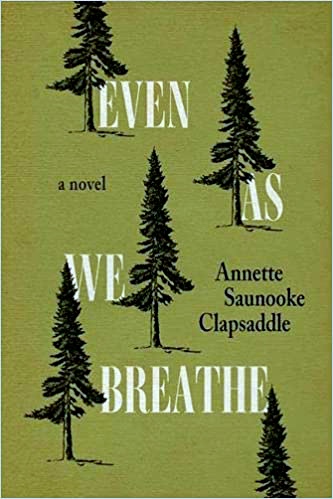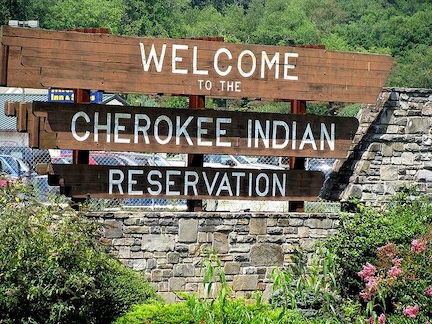“This land is ours because of what is buried in the ground, not what words appear on a paper. But all know this: what is buried in the ground isn’t always what you think. It’s just the beginning…the beginning of all of us who call ourselves Homo sapiens. Fitting, I guess, that what I found buried [a bone], just as I was trying to figure out how to become a man and still be human, was the very thing that threatened to take it all away.” – Cowney Sequoyah, 1942.
 Debut author Annette Saunooke Clapsaddle adds a whole new element to the Native American novels published in recent years. Her main character, Cowney Sequoyah, in his late teens, has recognized an opportunity to improve his life beyond what he experiences on the Cherokee reservation in North Carolina, by working for the summer at the Grove Park Inn, an elegant hotel in Asheville, North Carolina, several hours’ ride from Cherokee. Cowney dreams of completing his college education, but he is in desperate need of funds if he is to do that. He also has additional problems: He never knew his father, who died in World War I when Cowney was only four months old, and he was brought up by his grandmother, who now has “empty kitchen cabinets” and no way to feed him. An often drunk and vindictive uncle who served in the war with his father has been employing Cowney in recent years to work long hours on his own farm, and Cowney sees no future there. His only “salary” consists of small amounts of milk, eggs, and meat which he quietly sets aside for his own daily sustenance.
Debut author Annette Saunooke Clapsaddle adds a whole new element to the Native American novels published in recent years. Her main character, Cowney Sequoyah, in his late teens, has recognized an opportunity to improve his life beyond what he experiences on the Cherokee reservation in North Carolina, by working for the summer at the Grove Park Inn, an elegant hotel in Asheville, North Carolina, several hours’ ride from Cherokee. Cowney dreams of completing his college education, but he is in desperate need of funds if he is to do that. He also has additional problems: He never knew his father, who died in World War I when Cowney was only four months old, and he was brought up by his grandmother, who now has “empty kitchen cabinets” and no way to feed him. An often drunk and vindictive uncle who served in the war with his father has been employing Cowney in recent years to work long hours on his own farm, and Cowney sees no future there. His only “salary” consists of small amounts of milk, eggs, and meat which he quietly sets aside for his own daily sustenance.
 Author Clapsaddle moves back and forth in time and place creating vivid pictures of daily life on the reservation and the contrasts to Asheville, establishing some of the pleasant, even important, memories Cowney has brought with him. At the inn, he learns that some German and Japanese diplomats are being held there as “guest” prisoners until they can eventually be deported. His job is working on the grounds, helping to maintain the barbed wire around the property to prevent escapes, while Essie, a young Cherokee girl, whom he has transported with him from the reservation to the inn to work, has a job inside the inn. Almost immediately, while digging holes for fence posts, Cowney finds a curved bone, which “reminded me of home and what I loved about home – the simplicity of knowing what each day held.” The bone itself was “smooth and porous, a slight c-curve angled in motion…like a subhuman scythe, though innately human. Maybe even the core of humanity,” an inflated conclusion that he now regards as “an embarrassing indulgence of make-believe for a nineteen-year-old.” The bone, however, becomes symbolic for Cowney and for the reader, reappearing throughout the novel and linking Cowney’s culture and his feelings for the bones of the earth and bones of humanity.
Author Clapsaddle moves back and forth in time and place creating vivid pictures of daily life on the reservation and the contrasts to Asheville, establishing some of the pleasant, even important, memories Cowney has brought with him. At the inn, he learns that some German and Japanese diplomats are being held there as “guest” prisoners until they can eventually be deported. His job is working on the grounds, helping to maintain the barbed wire around the property to prevent escapes, while Essie, a young Cherokee girl, whom he has transported with him from the reservation to the inn to work, has a job inside the inn. Almost immediately, while digging holes for fence posts, Cowney finds a curved bone, which “reminded me of home and what I loved about home – the simplicity of knowing what each day held.” The bone itself was “smooth and porous, a slight c-curve angled in motion…like a subhuman scythe, though innately human. Maybe even the core of humanity,” an inflated conclusion that he now regards as “an embarrassing indulgence of make-believe for a nineteen-year-old.” The bone, however, becomes symbolic for Cowney and for the reader, reappearing throughout the novel and linking Cowney’s culture and his feelings for the bones of the earth and bones of humanity.

(Omni) Grove Park Inn, Asheville, NC
Foreshadowing plays a large part in much of the action here, as does the use of flashbacks to connect sections from Asheville (and Essie) with other sections, often involving the greatness of nature which Cowney notes when he returns to Cherokee, occasionally, on weekends. Essie’s discovery of a secret room on the fourth floor of the inn allows the two to get together, innocently, to compare notes about life at the inn and their own goals. Essie, though Cherokee, comes from a significantly different background, with a father often away for his job, and a mother who wants Essie to marry someone relatively well off to keep her “entertained” when when her husband is gone. Still, they continue their friendship – until two events occur almost simultaneously: Cowney discovers that Essie has become very friendly with another man, and a little girl, the daughter of one of the foreign “guests,” goes missing. Somehow, Cowney is suspected of being involved in the disappearance, and the bone he has discovered and treasured is now regarded as grounds for suspicion.
 Having established two radically different settings – Cherokee, N.C. and Asheville – and people who differ greatly in culture and values – the author moves in for a closer look at both cultures. The dominant white culture, which assumes almost automatically that a brown person is responsible for the missing child – and therefore should be investigated thoroughly – and the innocence of someone like Cowney, who never suspects evil motives from those with whom he has become friends at the inn. When he has to return home to oversee the final days of his grandmother’s life, and later those of his Uncle Bud, he learns more about his parents, but he also learns that he has the inner resources to deal with many unexpected twists and turns in his life on his own. He has also become confident enough to trust some people who want to help him and to forgive others who have deliberately hurt him in order to help themselves.
Having established two radically different settings – Cherokee, N.C. and Asheville – and people who differ greatly in culture and values – the author moves in for a closer look at both cultures. The dominant white culture, which assumes almost automatically that a brown person is responsible for the missing child – and therefore should be investigated thoroughly – and the innocence of someone like Cowney, who never suspects evil motives from those with whom he has become friends at the inn. When he has to return home to oversee the final days of his grandmother’s life, and later those of his Uncle Bud, he learns more about his parents, but he also learns that he has the inner resources to deal with many unexpected twists and turns in his life on his own. He has also become confident enough to trust some people who want to help him and to forgive others who have deliberately hurt him in order to help themselves.

Charlie Chaplin in his first “talkie,” THE GREAT DICTATOR
One of the great joys of this novel is that author Clapsaddle’s point of view is totally honest, an honesty reflected in the character of Cowney. Since the author herself is an enrolled member of the Eastern Band of Cherokee Indians, she obviously knows what she is talking about here, and she clearly loves the connections to nature which the book celebrates. In a great irony, Cowney, at the end, goes to see Charlie Chaplin’s first “talkie” film, and is stunned by Chaplin’s final speech in which he says, “The Kingdom of God is within man, not one man, nor a group of men, but in all men….I thought of about how utterly different everyone [in the audience] seemed. How each of us was motivated by so many different things, and yet here we were, all sitting together being reminded of our commonality by a comedian.” Years later, as Cowney, an old man, contemplates his own life, he knows in his heart that “this land is ours because of what is buried in the ground…and the only thing separating us is the stories we choose to tell about them.” This novel’s stories and its people will echo throughout the memories of many of its readers for a long time.
Photos. The author’s photo appears on https://www.asaunookeclapsaddle.com
The Grove Park Inn, now an Omni hotel, is found on https://www.omnihotels.com
The welcoming sign to Cherokee, NC, is from https://www.pinterest.com
Charlie Chaplin, appearing in his first “talkie,” The Great Dictator, 1940, gives a concluding speech which Cowney thought was the best speech he’d ever heard. https://medium.com
Human rib bones, like the bone Cowney found while working at the inn, led him to see the world differently. https://www.skullsunlimited.com

